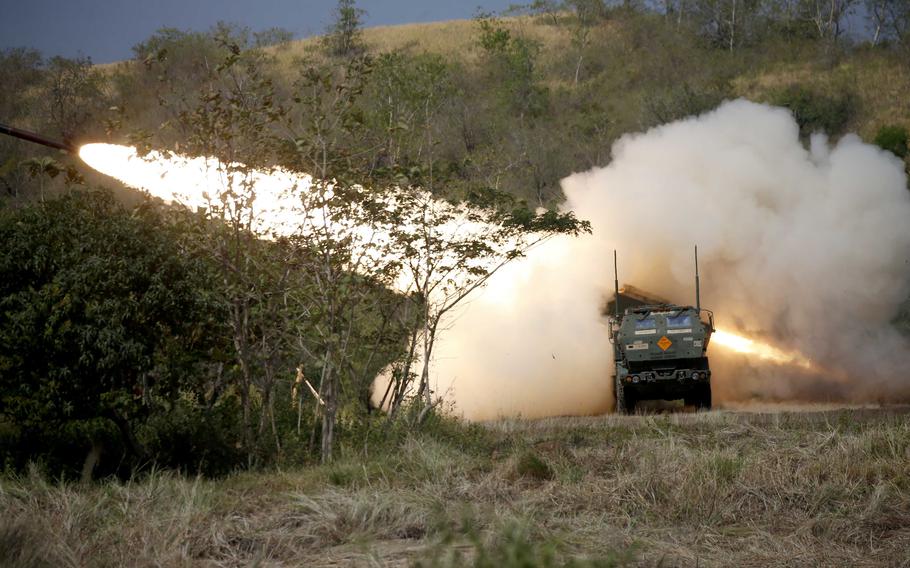
Soldiers fire a U.S. Army High Mobility Artillery Rocket System, or HIMARS, during the annual Salaknib exercise at Fort Magsaysay, Philippines, Friday, March 31, 2023. (Bullit Marquez/For Stars and Stripes)
The U.S. Army notched another live-fire practice with its High Mobility Artillery Rocket System, or HIMARS, during training Friday with Philippine forces on the island of Luzon.
Soldiers with U.S. Army Pacific fired six HIMARS rockets from a site north of Manila as part of the annual Salaknib drills that began March 13 and conclude Tuesday, Capt. Stacey Lasay, a spokeswoman for the 2nd Infantry Brigade Combat Team, 25th Infantry Division, told Stars and Stripes by email Monday. The HIMARS rockets were fired into an open area and had no specific target, she said.
U.S. and Filipino troops also fired AT-4 anti-tank weapons at Fernandez Hill on Fort Magsaysay, a sprawling military reservation on Luzon, following the HIMARS practice, Lasay said.
U.S. and Filipino troops also practiced marksmanship with automatic rifles, she said.
The 2nd Brigade deployed 1,500 troops from Schofield Barracks, Hawaii, to the Philippines for the training, unit commander Col. Graham White said by phone from Fort Magsaysay on March 12.
This year’s Salaknib has included small-arms, maneuver, jungle, artillery and mortar training as well as engineering and construction projects.
The truck-mounted HIMARS can strike targets 50 miles away and rapidly move around the battlefield, making it a tough target to find. Last year, the U.S. sent HIMARS launchers to Ukraine to help battle Russian invaders.
U.S. forces have demonstrated the HIMARS in the Philippines several times. The mobile rocket system is part of a U.S. strategy in the Indo-Pacific to counter China’s anti-access, area-denial strategy in island chains of the western Pacific.
Marine Corps HIMARS conducted live-fire drills at Crow Valley Military Reservation north of Clark Air Base on Luzon during October’s annual Kamandag drills. Army HIMARS was fired from Colonel Ernesto Rabina Air Base in Tarlac, as part of the previous Salaknib exercise in March 2022.
During Balikatan, another annual U.S.-Philippine drill in the islands this month, a U.S. HIMARS will fire on a decommissioned fishing boat in waters off Luzon, the government-run Philippine News Agency reported March 16.
Balikatan, which runs April 11-28, will involve 12,000 American and 5,000 Filipino troops along with about 100 Australians and observers from Japan and South Korea, according to the agency.